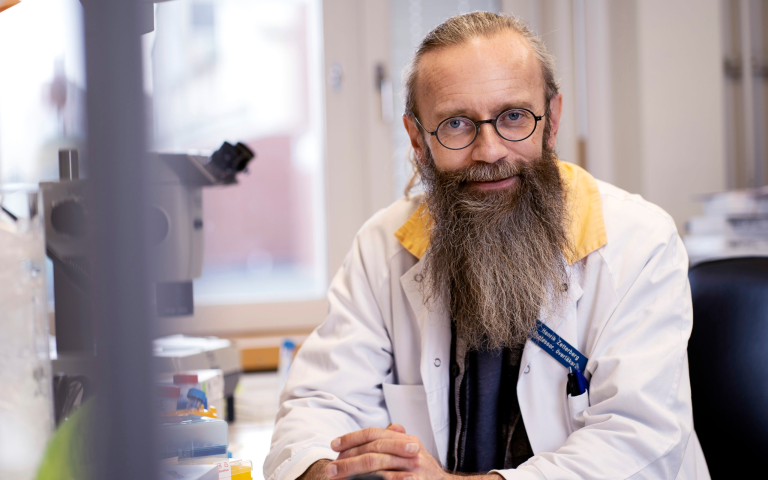Biomarkers have huge potential to transform our understanding of brain disorders such as Alzheimer’s.

Professor Henrik Zetterberg is a world expert on biomarkers. He investigates how these markers, measured in the fluids and tissues of the body, could help revolutionise diagnostics and treatments for Alzheimer’s disease and other brain disorders.
Biomarkers are of huge importance for two reasons. First, they enable diagnosis and early detection of a disease before people experience symptoms. Second, they are crucial for monitoring and measuring the effectiveness of treatments.
In 2021 Professor Zetterberg established the UK Dementia Research Institute ‘Biomarker Factory’ at UCL to find new ways to detect and monitor neurodegenerative diseases.
He explains that in conditions like Alzheimer’s, changes to the brain often begin decades before symptoms appear. Treating the disease process at the earliest stages is important if we are to slow or prevent its progression. By allowing us to monitor the course of a disease, biomarkers can help us not only understand the disease better but provide valuable information on how we can develop effective and targeted treatments.
Advances in technology have enabled Professor Zetterberg and his team to create ultrasensitive blood tests for biomarkers that indicate the presence of Alzheimer’s. He describes these ultrasensitive tests as one of the most exciting parts of his work. Blood tests have huge advantages over the PET scans traditionally used for diagnosis, which are expensive and not widely available.
The ultrasensitive tests use digital technology to count individual molecules in the blood: Professor Zetterberg likens this to dissolving a fragment of a sugar cube in an Olympic-sized swimming pool and attempting to measure the sugar concentration from a tiny sample of the pool.
“This is the challenge, and it’s almost impossible,” he explains. “Regular chemistry tests in clinical laboratories around the world don’t allow us to measure these concentrations and so you have to have a specialised digital technique to obtain this data.”
Professor Zetterberg’s original interest in developing diagnostic tests for neurodegenerative conditions developed from his early realisation that there was a huge gap in our knowledge. “It became quite obvious that while we have good clinical chemistry tests for cardiac disease, kidney disease, liver disease, gastrointestinal disease, inflammation and haematology, we have so little for brain diseases,” he says.
In the past it was only possible to understand the course of a brain disease based on a patient’s symptoms and from studying brain tissues from the deceased. More recently, scientists developed a way to analyse the fluid around the human brain and spinal cord, although this involves an invasive lumber puncture procedure.
Being able to diagnose conditions like Alzheimer’s from a single blood sample is therefore a monumental step forward. Professor Zetterberg is hopeful that the blood tests for Alzheimer's will be clinically available in the UK within a year or two. He’s also working with biomarkers that indicate other rarer forms of dementia, such as Lewy body and frontotemporal dementia, which can be difficult to diagnose.
Along with diagnosis, another important part of Professor Zetterberg’s research involves using biomarkers to monitor how an individual responds to a certain drug and what dosage is most effective. He points out that this is something we are able to do with heart and liver diseases, and so using biomarkers to apply a similar process to brain diseases could prove to be transformative.
“Diagnostic tests of the blood mean that you can more rapidly give an accurate diagnosis and initiate a treatment. You can then use blood tests to monitor whether the drug is working and refine the dosage. By optimising treatments in this way, we can hopefully slow down or stop the disease process before someone becomes too ill,” he explains.
A common theme in neurodegenerative conditions is the build-up of protein clumps in the brain, which are often associated with ageing. “Once protein clumps have started to appear the disease process becomes self-propagating and so this is what we are trying to stop with some of the promising treatments that are now being developed.”
Professor Zetterberg is optimistic about the recent development of drugs that target protein clumps, such as amyloid, in the brain.
“I think we are in a new era and it's going extremely fast. These are complex diseases and there are no magic bullets, but the anti-amyloid drugs that we are seeing now are definitely starting to do something to the disease process,” he says.
He is also hopeful about drugs known as antisense oligonucleotides, which can be used to treat childhood neurodegenerative disease and are showing promising results for Huntington's disease and a rare neurological disease known as amyotrophic lateral sclerosis.
“There is still a lot to learn and so we have to start using these new treatments in conjunction with biomarkers, and work together with patients and colleagues to build momentum so that we can make real progress in treating neurodegenerative conditions. I think the coming years will be exciting and things are really starting to look promising.”
 Close
Close

